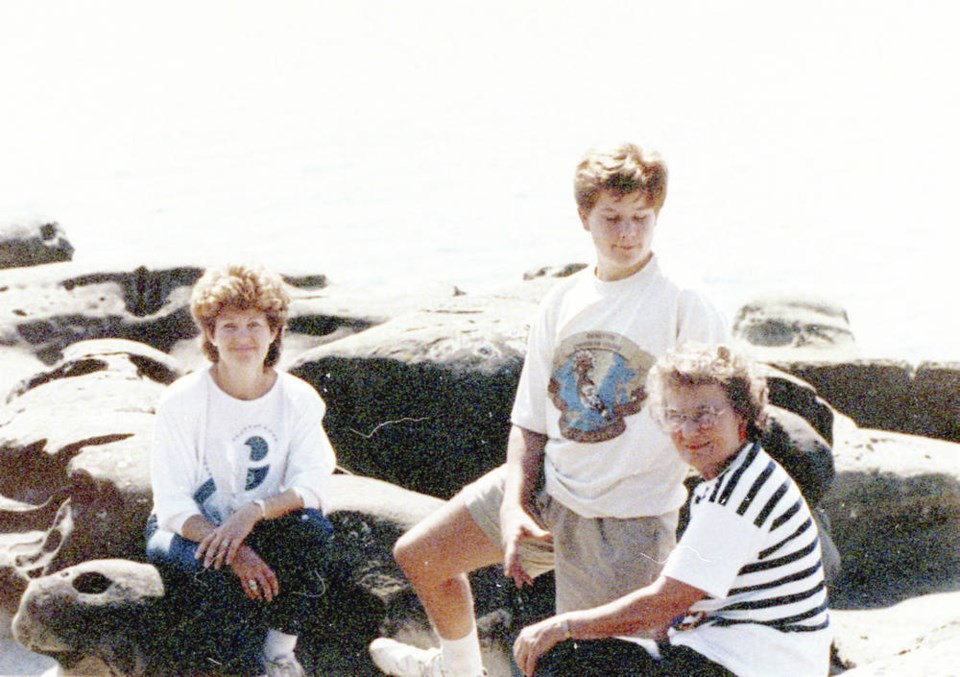A man who contracted his Mount Douglas Secondary classmates to kill his mother and grandmother in 1990, promising them a cut of a $4-million inheritance, still poses too much of a risk to society to be allowed to leave jail unescorted, the Parole Board of Canada has ruled.
Darren Huenemann, who is now using his biological father’s surname, Gowan, has been in jail for almost 30 years, serving a life sentence for the first-degree murder of his mother, Sharon Huenemann, and her mother, Doris Leatherbarrow.
After a hearing on Oct. 15, the parole board denied Gowan’s request for unescorted temporary absences from a minimum-security correctional facility in Quebec, saying that while Gowan, now 48, has made some progress in addressing his anger and narcissistic personality disorder, he still presents a moderate risk to reoffend.
Judy Bonkoff, the daughter of John Kriss, who is Leatherbarrow’s brother, said she is pleased with the board’s decision.
“We can never agree for him to have his freedom, because he stole my aunt and my cousin from our family,” said 68-year-old Bonkoff, who lives in Gibsons.
“It’s very, very hard for for us to forgive him for what he did.
“It was his mother and his grandmother, and he had them killed. He had them murdered.”
Gowan, then 18, was at his Saanich home with his girlfriend on the night of Oct. 5, 1990, when his schoolmates Derik Lord, then 17, and David Muir, 16, killed Leatherbarrow and Huenemann.
Lord and Muir took a ferry to Leatherbarrow’s Tsawwassen home, knocked on the door and were invited in for dinner. They used crowbars and kitchen knives to murder Leatherbarrow, 69, and Huenemann, 47. The teens staged the killings to look as if they occurred during a robbery.
All three teens were convicted of first-degree murder in 1992 and sentenced to life in prison. Muir, who early on admitted his role in the killings, has been on full parole since 2003.
Lord, now 47, maintains his innocence and has been on day parole since March 2020. His conditions allow him to live at a community residential facility and work at a camp in northern B.C.
Gowan had asked for unescorted temporary absences for personal development at a community residential facility, also known as a halfway house. The release plan, recommended by Gowan’s case-management team, would involve a two-day unescorted temporary absence once a month, eventually increasing to three-day absences.
The parole board told Gowan that he needs a very gradual reintegration process, “considering the seriousness of your criminality, your rigidity, your narcissism, and your high level of institutionalization.”
Gowan’s case-management team found he has a low potential for social reintegration.
The parole board in 2018 gave permission for Gowan to have escorted temporary absences so he could do community service and participate in personal development programs.
The parole board noted Gowan completed 107 escorted temporary absences for community service and 12 for personal development, and there were never any problems.
The parole board said Gowan should continue these escorted temporary absences, so he can work on his “risk factors.”
“Listening to you at the hearing, the board was more under the impression that your anger was being internalized, suppressed and controlled, as opposed to being managed appropriately,” the decision says.
“While the board certainly acknowledges the progress you have made throughout the years, it finds that much work remains to be done in order for your risk to be acceptable in the community in the context of w[unescorted temporary absences].”
Several medical professionals have diagnosed Gowan with narcissistic personality disorder. A 2017 psychiatric assessment showed that he made significant progress over the years, accepting blame for the murders and showing regret, remorse and empathy for the people harmed because of his crime.
A subsequent assessment in May 2020 found that Gowan showed fewer antisocial and narcissistic personality traits. That psychiatric assessment found that Gowan does not present an undue risk for society in the context of an escorted temporary absence.
Gowan is currently in a minimum-security jail, where he completed training in food processing while working in the central kitchen.
In victim-impact statements to the parole board, relatives of Leatherbarrow and Huenemann asked that Gowan be denied any form of freedom, saying he is dangerous and manipulative, and they fear for their safety if he is released.
They asked that any potential release conditions prohibit Gowan from travelling to B.C. or having contact with any member of the victims’ family.
Ed Beketa, Leatherbarrow’s brother-in-law, said he wasn’t notified about the parole hearing on Oct. 15.
“It is disappointing because usually they keep in touch with us quite well,” said Beketa, adding he’s lost confidence in some of the parole board members. After the board granted day parole to Lord, “I thought, what’s the point?” he said.
“To give Lord, who brutally murdered two beautiful people, to give him freedom of any kind is pretty sad.”
Beketa said the family re-lives the pain every time they’re notified of another parole hearing. “After dealing with this for 30 years, it opens wounds,” he said.
Gowan previously told the parole board his mother was controlling and he felt constant pressure to live up to her expectations.
Parole board members found that Gowan was motivated by greed and a belief he was entitled to the inheritance.
In 1995, Gowan and other inmates escaped from a correctional facility, assaulting a staff member, stealing a vehicle and leading police on a high-speed chase until their arrest.
Gowan was convicted of escaping lawful custody and assault causing bodily harm. However, the parole documents noted that Gowan’s behaviour improved after he completed an anger-management program in 2005, and that he has been involved in no violent incidents in prison for years.
kderosa@timescolonist.com



